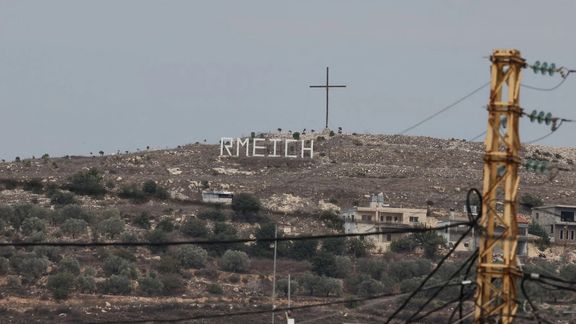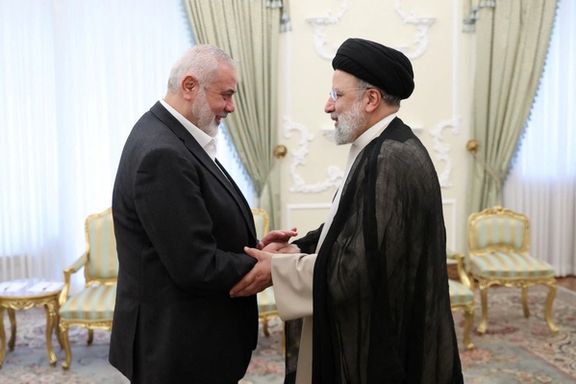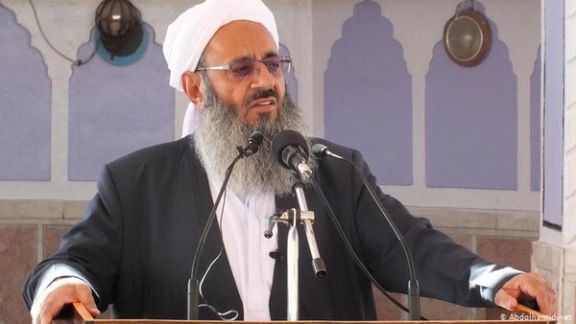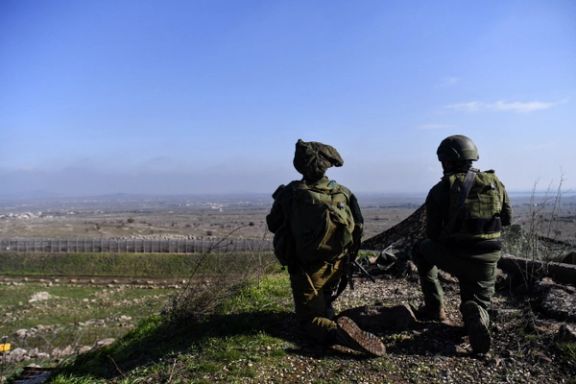Lebanon’s Christians Decry Being Used As Human Shields By Hezbollah

Christian communities in southern Lebanon have openly opposed Hezbollah’s rocket launches towards Israel as they are used as human shields in the ongoing conflict.

Christian communities in southern Lebanon have openly opposed Hezbollah’s rocket launches towards Israel as they are used as human shields in the ongoing conflict.
Speaking on behalf of the residents of Rmeish village (also Rmaych and Rmaich) in the region, a local stated that they categorically reject any attempt to use villages as launch sites for attacks on Israel.
Hezbollah and Israeli forces have exchanged fire repeatedly in the months since the Gaza war began following the Hamas attack on Israel on October 7.
Another local emphasized the consequences of Hezbollah's actions, saying, "Due to the war, which has nothing to do with the people of the region and is nothing but the destruction of Lebanon, they have suffered economic losses. They decided to return to their homes out of fear of displacement."
Hezbollah has sent over 3,000 projectiles to Israel since October and over 100,000 Israelis have subsequently been displaced.
As the conflict continues, casualties continue to mount on both sides, with Hezbollah sustaining significant losses to its faculties and command structure.
However, the Christian communities remain resolute in their opposition to Hezbollah's tactics as they are used as human shields.
With Easter festivities on the horizon, tensions are expected to remain high as Hezbollah remains committed to its battle against Israel in support of Hamas in Gaza.

The head of the Hamas Political Bureau, Ismail Haniyeh, met with Iran's President Ebrahim Raisi on Wednesday during a trip to Tehran's top leadership amid the war in Gaza.
Haniyeh and the Palestinian delegation also met with Iran's supreme leader Ayatollah Ali Khamenei, where Khamenei reiterated Iran's support for Palestine and condemned Israel's retaliatory attacks in the wake of the war waged by the Palestinian Islamist group in October.
"The Islamic Republic of Iran will not hesitate in supporting the cause of Palestine and the oppressed and resilient people of Gaza," Khamenei said.
The visit marks Haniyeh's second trip to Tehran since the Hamas invasion of Israel on October 7 which resulted in the deaths of some 1,200 mostly civilians, and the kidnapping of more than 250 to Gaza.
The meetings with Iran's top leadership reveal the high-level connections Hamas has with Iran, which has long backed the group designated by countries including the UK.
Last year, Haniyeh also held top level meetings with Iranian leaders alongside fellow proxies such as Hezbollah, also funded, trained and armed by Iran.
Israel's retaliatory campaign aiming to eliminate the terror group and rescue the remaining hostages has led to the deaths of over 30,000, according to the Hamas-run health ministry in Gaza.
The latest visit comes on the back of this week's UN Security Council resolution calling for a ceasefire in Gaza amid a humanitarian crisis.
During a press conference in Tehran, Haniyeh claimed the resolution “signals Israel's waning international support”.

Mowlavi Abdolhamid, the Sunni Friday prayer leader of Zahedan, reiterated his demands for a final verdict on the tragic Bloody Friday massacre.
Addressing the injured and families of the deceased from the bloody Friday massacres of Zahedan and Khash, he told them, "The injustice is incompatible with the Islamic, and humanitarian standards."
On September 30, 2022, state security forces targeted those planning to hold a protest gathering after Friday prayers in Zahedan, resulting in over 100 deaths as reported by human rights sources. Another protest on November 4, 2023, in Khash county, led to the deaths of 16 more citizens.
Abdolhamid has persistently called for the trial of the perpetrators and organizers of the massacres, reaffirming, "Those who suffered in the incident were innocent."
The Baluch activists campaign reported that two sessions of the trial were held in February. However, the presiding judge, without hearing the statements of the families of the dead, asked them to accept compensation, which they opposed.

In response to a trend of young doctors' suicides in Iran, the Medical Council Of Iran has announced the formation of a fact-finding mission.
Parastoo Bakhshi, a 34-year-old specialist in cardiovascular diseases, took her own life at her residence in Noorabad Delfan Hospital in Lorestan Province, the latest in a string of mystery deaths.
The confirmation came from an official statement by the Medical Council Of Iran, citing "excessive pressure in the workplace" as a contributing factor.
Bakhshi's body was discovered by staff members in the hospital's dormitory last Saturday night, sparking shock and grief among her colleagues and the medical community at large.
Ali Salahshour, head of the Public Relations and International Affairs Department of the Medical Council of Iran, took to Instagram to highlight the additional burden Bakhshi faced after the loss of both her parents in the past four years.
Farhad Teimourzadeh, a physician and university professor, also echoed the sentiments on social media, condemning those in positions of power who exert pressure on medical residents.
Suicide among medical students, particularly in Iran, has become a growing concern, with several reports documenting the issue in recent years. According to a study conducted by a psychiatric association last year, the suicide rate within the medical community has seen a significant rise, ranging from 3.1 to 5 times higher than previous years.
In February, the head of the Iranian Psychiatric Scientific Association disclosed the news of 16 medical residents who had taken their own lives in the past year alone.

The United States refuted Iranian and Syrian claims of conducting dawn airstrikes in Syria after an attack which saw the deaths of seven soldiers and a Revolutionary Guards member.
Syrian state news agency SANA blamed "US occupation aggression" for the attack while Pentagon spokesperson Sabrina Singh categorically stated the US "did not carry out airstrikes in Syria last night," addressing reporters in Washington.
Syrian state media said a civilian was also killed and at least 19 other soldiers and 13 civilians were wounded in strikes on residential areas and military sites in Deir al Zor province, with significant damage to public and private properties.
Iranian state media said a Revolutionary Guards adviser was killed in the airstrikes, without giving his rank.
Syria's Foreign Ministry condemned the strikes, alleging US actions mirrored Israeli aggression and aimed to destabilize the region.
Syria is a hub for Iranian militias which have a strong presence in Syria's eastern province of Deir el-Zour near the Iraqi border where Tehran has expanded its military presence. Iranian-backed forces in eastern Syria have also carried out numerous attacks on US facilities in the remote area.
Last month, US retaliatory strikes killed 29 pro-Iran fighters in the Deir el-Zour and Mayadeen areas after a deadly drone strike resulted in the death of three US troops in Jordan.
Iran claims its officers operate in Syria in an advisory capacity, having been invited by Damascus to aid President Bashar al-Assad in countering both internal and external threats. The support extends to the decade-long civil war, during which opposition forces unsuccessfully sought to overthrow Assad.
Israel too has conducted strikes against Iranian positions in the country in addition to the likes of ports and airports in a bid to stop the flow of weapons into the country from Iran, smuggling into proxies around the region.

US President Joe Biden faced criticism on Tuesday as the Hamas chief visited Tehran and praised Israel’s “political isolation” – just a day after the UN Security Council voted for a ceasefire Israel opposed.
The Biden administration abstained from using its veto power Monday as members of the UN’s most powerful body voted to demand an immediate ceasefire in Gaza. The decision enraged the Israeli government and its supporters in Washington, who felt their government had “betrayed” Israel and sided with Hamas.
That sentiment only intensified when the Hamas leader traveled to Iran in what some critics of Joe Biden called “a victory lap”. The red carpet was ceremoniously laid out to welcome him, a carefully choreographed spectacle aimed at unnerving adversaries and, crucially, to bolster the Islamic Republic's image as the unwavering defender of the Palestinian cause.
“Iran stands at the forefront of supporting the cause and people of Palestine,” Haniyeh said. “I extend special thanks to the Supreme Leader of the Islamic Revolution of Iran, the President of Iran, and the people of Iran.”
Critics of the Biden administration, predominantly from the Republican side, interpret this as the epitome of a failing foreign policy, particularly concerning the Middle East and the regime in Tehran.
“Biden's confused, contradictory policies regarding Israel's struggle against Hamas and Iran are dangerous,” former US national security advisor John Bolton wrote in the Hill. “America should flatly reject the concept of Hamas having a "terrorist veto" over Israel's right to self-defense. If we don't, Israel and our anti-terrorism efforts globally will be significantly weakened.”
The war in Gaza, and the US response to it, has become yet another wedge, widening and deepening the partisan divide in American politics. The unbridgeable rift places President Biden in an exceedingly challenging position, where any decision he makes is susceptible to criticism from both sides simultaneously.
“Today the Biden Admin betrayed Israel and sided w/ Iran-backed Hamas terrorists who continue to hold US hostages,” Senator Bill Hagerty (R-TN) commented on X. “The Admin is so desperate to appease the pro-Hamas left that it is willing to advocate against the interests of our ally & our own citizens still held hostage.”
This, naturally, is not how Democrats, particularly those labeled by Hagerty as the “pro-Hamas left,” perceive the situation or the President's role. In their eyes, Biden has not gone far enough in confronting the Israeli government and halting what nearly every international and aid organization has termed a humanitarian crisis.
“To pretend that Israel is not violating international law or interfering with US humanitarian aid is absurd on its face,” Senator Bernie Sanders (D-VT) said Tuesday after a spokesperson for the Department of State told reporters that there were no reasons to dispute Israeli assurances that it was complying with humanitarian law in Gaza.
“The state department’s position makes a mockery of US law and assurances provided to Congress,” Sanders continued.
Jeremy Konyndyk, a former senior Biden official who now heads Refugees International, also accused Washington of not doing enough to pressure Israel.
“You can't fight famine by half-measures, and that seems to be all the Biden administration can muster right now,” Konyndyk posted on X. “Until Biden is ready to impose real policy consequences on Netanyahu's government, the famine will continue.”
Given the fervor and intensity of stances on both sides of the aisle, make it difficult to anticipate the Biden administration's course of action in the days and weeks ahead.
The potential invasion of Rafah by Israeli forces threatens to escalate the already strained relationship between the US and Israel to its breaking point. US Vice President Kamala Harris recently called it a “huge mistake” that could have “consequences” for Israel.
These developments are viewed from Tehran with triumph and glee. The Iranian regime has no doubt increased its influence since the October 7th attack on Israel. Israel’s image, meanwhile, has been seriously challenged, if not tarnished. Meanwhile, the Islamic Revolutionary Guards (IRGC) and its armed proxy groups across the region have grown in cohesion and confidence.
Iran's Supreme Leader Ali Khamenei now likely wields greater leverage in managing relations with the US and regional adversaries, particularly concerning its domestic matters such as freedom and human rights – often considered secondary to regional security by global powers.
This new-found position has come at high price, albeit not for the Iranian regime.